

Fear of a living planet. Moraine Lake, Banff National Park, Alberta.
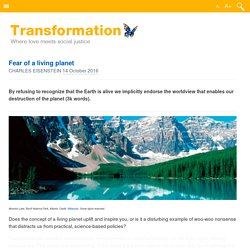
Credit: Wikipedia. Some rights reserved. Does the concept of a living planet uplift and inspire you, or is it a disturbing example of woo-woo nonsense that distracts us from practical, science-based policies? The scientifically-oriented nuts-and-bolts environmental or social activist will roll her eyes upon hearing phrases like “The planet is a living being.” From there it is a short step to sentiments like, “Love will heal the world,” “What we need most is a shift in consciousness,” and “Let’s get in touch with our indigenous soul.” What’s wrong with such ideas? I think that argument is mistaken. The psychology of contempt. To see that, let’s start by observing that the objection to “Earth is alive” isn’t primarily a scientific objection. Why Cultural Diversity Is as Essential to Human Survival as Biological Diversity. “We, the children of Afrika, will never realize our full potential if we continue to depend wholly on the content and ways of knowledge of the European peoples.
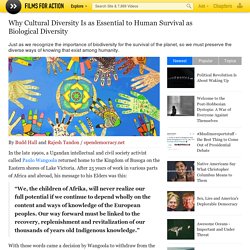
Our way forward must be linked to the recovery, replenishment and revitalization of our thousands of years old Indigenous knowledge.” With those words came a decision by Wangoola to withdraw from the economic structures of the Western world, return to a subsistence life style, and dedicate himself to the creation of a village-based institution of higher education and research known as the Mpambo, Afrikan Multiversity: a place for the support of mother-tongue scholars of Afrikan Indigenous knowledge. Fast forward to 2005 in Durban, South Africa, where some of the inhabitants of the tin-roofed shacks of the city created a blockade on Kennedy Road to protest the sale of land originally promised to the poor for building homes, but subsequently offered to a commercial developer. Dr. Paulo Wangoola speaks at the University of Victoria, October 25th, 2013.
Boaventura de Sousa Santos - Wikipedia. Boaventura de Sousa Santos is a Professor at the School of Economics at the University of Coimbra, Distinguished Legal Scholar at the University of Wisconsin-Madison Law School, Global Legal Scholar at the University of Warwick and Director of the Centre for Social Studies (CES) at the University of Coimbra.
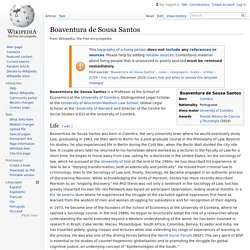
Life[edit] Boaventura de Sousa Santos was born in Coimbra, the very university town where he would eventually study Law, graduating in 1963. He then went to Berlin for a post-graduate course in the Philosophy of Law. Beyond his studies, he also experienced life in Berlin during the Cold War, when the Berlin Wall divided the city into two. A couple years later he returned to his hometown where worked as a lecturer in the Faculty of Law for a short time. David Harvey - Wikipedia. David W.
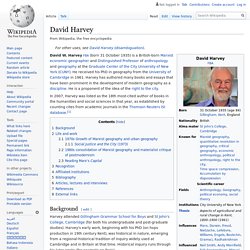
Harvey FBA (born 31 October 1935) is a British-born Marxist economic geographer and Distinguished Professor of anthropology and geography at the Graduate Center of the City University of New York (CUNY). He received his PhD in geography from the University of Cambridge in 1961. Harvey has authored many books and essays that have been prominent in the development of modern geography as a discipline. He is a proponent of the idea of the right to the city. In 2007, Harvey was listed as the 18th most-cited author of books in the humanities and social sciences in that year, as established by counting cites from academic journals in the Thomson Reuters ISI database.[1] Background[edit] David Harvey lecturing a class Harvey attended Gillingham Grammar School for Boys and St John's College, Cambridge (for both his undergraduate and post-graduate studies).
Harvey resides in New York. Life and work[edit] 1970s Growth of Marxist geography and urban geography[edit] Reading Marx's Capital[edit] Umhlaba Izindlu neSithunzi Land Housing Dignity. Western canon - Wikipedia. Books, music and art traditionally accepted by Western scholars as the most important in shaping Western culture Detail of Sappho from Raphael's Parnassus (1510-11), shown alongside other poets.
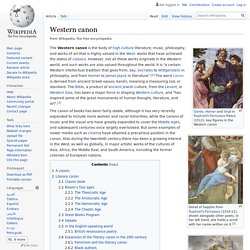
In her left hand, she holds a scroll with her name written on it. The Western canon is the body of high culture literature, music, philosophy, and works of art that is highly valued in the West: works that have achieved the status of classics. However, not all these works originate in the Western world, and such works are also valued throughout the world. Les peuples indigènes du monde se réunissent en ce moment. Leur but : préserver la planète. Wade Davis sur les cultures en voie de disparition. Wade Davis, Anthropologist/Ethnobotanist Information, Facts, News, Photos.
Wade Davis was named by the NGS as one of the Explorers for the Millennium, he has been described as “a rare combination of scientist, scholar, poet and passionate defender of all of life’s diversity.” In recent years his work has taken him to East Africa, Borneo, Nepal, Peru, Polynesia, Tibet, Mali, Benin, Togo, New Guinea, Australia, Colombia, Vanuatu, Mongolia and the high Arctic of Nunuvut and Greenland. An ethnographer, writer, photographer, and filmmaker, Davis holds degrees in anthropology and biology and received his Ph.D. in ethnobotany, all from Harvard University.
Mostly through the Harvard Botanical Museum, he spent over three years in the Amazon and Andes as a plant explorer, living among fifteen indigenous groups in eight Latin American nations while making some 6000 botanical collections. Matriarcat berbère Maure Beydane face à l’islam : plus tu as de maris, plus tu es respectable. « Je vous assure que nous respectons bien les hommes.
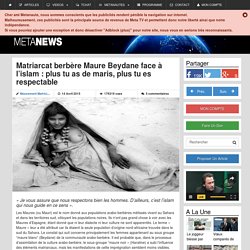
D’ailleurs, c’est l’islam qui nous guide en ce sens ». Les Maures (ou Mauri) est le nom donné aux populations arabo-berbères métissés vivant au Sahara et dans les territoires sud, côtoyant les populations noires. Ils n’ont pas grand chose à voir avec les Maures d’Espagne, étant donné que ni leur dialecte ni leur culture ne sont apparentés. Le terme « Maure » leur a été attribué car ils étaient la seule population d’origine nord-africaine trouvée dans le sud du Sahara. Le constat qui suit concerne principalement les femmes appartenant au sous groupe “maure blanc“ (Beydane) de la communauté arabo-berbère. Lire Matriarcat Sahraoui (Maroc) : jusqu’au 17ème siècle avant l’arrivée de l’islam Par Natacha David. Reportage arte, desert de danakil. Les Matriciens chez les Moso (Tibet) - le royaume matriarcal de la déesse Gemu, la montagne-mère. Matriarcat berbère Maure Beydane face à l’islam : plus tu as de maris, plus tu es respectable.
À la découverte des mosos, cette tribu où les femmes décident de tout. Aux confins du sud-ouest de la Chine, non loin de la frontière Tibétaine, réside un peuple qui intrigue le reste du monde pour ses coutumes, mais surtout pour sa vision de l'amour et de la relation intime.
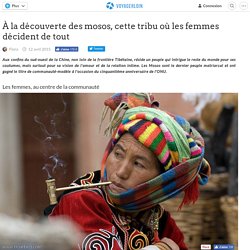
Les Mosos sont le dernier peuple matriarcal et ont gagné le titre de communauté-modèle à l'occasion du cinquantième anniversaire de l'ONU. Les femmes, au centre de la communauté Les Mosos vivent autour du lac Lugu, sur les rives des régions du Yunnan et Sichuan. Ce lac serait né des larmes de la déesse Gemu, que tous vénèrent. À la découverte des mosos, cette tribu où les femmes décident de tout. Regards du Sud - Peuples Indigènes. Peuples Indigènes 5ème émission juin 2005.
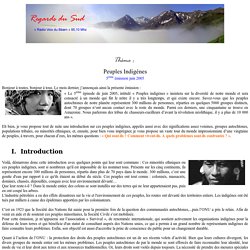
Persée : Portail de revues en sciences humaines et sociales. Jainism in Rajasthan. Rajasthan, a state in western India, has had a close historical connection with Jainism.
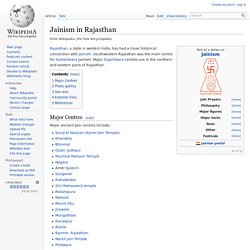
Southwestern Rajasthan was the main centre for Svetambara Jainism. Major Digambara centres are in the northern and eastern parts of Rajasthan. Major Centres[edit] Major ancient Jain centres include: Photo gallery[edit]